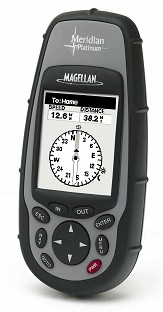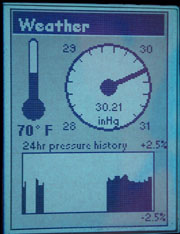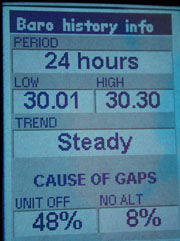Please see the review of the Meridian Gold for features common to both (HERE)
A Review by Jack Yeazel
(Add another review about DirectRoute Car Navigator and the GOLD 25 August 2004)
Return to GPS General Information Home Page


This unit, Ver. (3.08 Ver. 4.02, with a
NA M Land 1.03 base map) about $300.00US, check prices (HERE)
is basically a Meridian Gold with the addition
of an electronic compass and barometer, and is a competitor to the Garmin
GPSmap 76S.
NOTE: The
new MapSend
DirectRoute maps will provide more accurate maps plus provide automatic
routing. See User
Review by SeaJay Bayne describing his use of the GOLD version car kit
with the MapSend DirectRoute automatic car navigation system and maps.
This information is directly applicable to the Platinum model.
The Platinum Compass:
Compass Screen:
All of the navigation screens use the
compass information for heading data. Other than that they are the
same as in any of the other Meridian products. The Destination Pointer
graphically displays the bearing to the destination. The Destination
Icon further reinforces which way you need to turn to arrive at your destination.
Heading Pointer:
This pointer makes it a little simpler
to read your heading. Your heading is always in the direction of
the top of the Meridian Platinum so this arrow will always be pointing
straight up.
COG (Course Over Ground) Pointer and
Icon:
This unique pointer, not available in
the Garmin units, is a useful new feature. When using the Compass
Screen to steer to a destination, the goal is to align the destination
Pointer and the COG Pointer together. When both of these pointers
are lined up, regardless of your heading, you are moving in a straight
line to your destination. This is a welcome feature for sailing enthusiasts.
Note: The Destination Pointer points to North, and the Destination Icon disappears when there isn't an active route or GOTO.
Calibrating the Compass:
The electronic compass requires that it
is recalibrated every time the batteries are changed. Failure to
calibrate the compass could result in errors of 20° or more to the
displayed heading. Calibration is very simple and doesn't take more
than a couple of minutes. The calibration is similar to the Garmin
calibration, but adds one more step to accommodate the 3-axis capability
of this design. As usual, it's very important that there are no metallic
objects near the Meridian during this calibration.
1. Lay the unit down
face up on any LEVEL, non-metal surface.
2. Press the MENU button,
highlight “Setup”, and press ENTER .
3. Highlight “Compass
Calibrate” and press ENTER.
4. Using the on-screen
“bubble level”, set the Meridian on a level, non-metallic surface.
5. The Meridian Platinum
will provide the instructions on rotating the receiver.
6. Continue rotating
the Meridian Platinum until it beeps. (This will be slightly more
than one complete rotation.)
7. After the beep,
turn the Meridian Platinum FACE down. Very soon it will beep again.
When this happens, calibrating the compass is finished.
Compass Accuracy:
Although the compass accuracy is not stated,
Garmin's specified compass accuracy of 2° seems to be met in the Platinum.
(more testing to be done here)
Limitations to the Electronic Compass:
Electronic Compass’ have some limitations
as to how well it works in certain environments. Large metal objects
can affect how well it operates. As an example, using the Meridian
Platinum in an automobile you'll find that the compass does a great job
of pointing to the engine but not pointing to north. In this situation,
use the Setup option “Compass Orient.” to change the compass orientation
to "GPS Course". Then the Meridian Platinum will get its heading
from the GPS signals and not the electronic compass. NOTE: The compass
is active (unless turned off) at all speeds and not just below some set
speed -as with the Gamin GPSmap 76S.
Other limitations are in the angle holding the Meridian Platinum. Holding the receiver flat provides the most accurate readings but tilting it towards you is acceptable. Pay attention to the compass readings as you tilt it. At a certain, point the compass will begin to drift. The Meridian Platinum has compensated for tilt but still, the more it's tilted, the more will be the errors in the compass readings. The Meridian Platinum has a major advantage over many other electronic compasses on the market today in that it can be tilted and still maintain relatively accurate compass readings.
Battery life is limited up to 9 hours with the compass operating continuously. The compass is operating any time heading is being displayed. So, while on either of the two compass screens or on the Map Screen (the position cursor is pointing to your heading), the compass is running. On the other navigation screens, the compass is off unless Heading is selected for one of the data fields. In order to turn the compass (completely) off, go to Setup, and with the “Compass Orient” option, change it to “GPS Course”. To restore, select "Magnetic North".
The Platinum Barometer:
 ..........
..........
Accessing the Weather Screen :
From any screen press MENU, “Weather”,
and press ENTER. The Weather Screen is displayed with the current
temperature and barometer information. Temperature and barometric
information are displayed in a familiar and easy to read format.
The bottom of the display is a graphic of the barometric readings taken
over the last 24 hours. (The Meridian Platinum will take barometric
readings anytime the unit is active.)
A new bar indicating the barometric pressure is added to the graph once every 15 minutes. If during the course of an hour it has taken two readings, it fills in the gap between the readings. If, however, the receiver has been turned off, or it does do not have enough satellites to compute altitude (four satellites are needed for altitude computations), and only one reading or less has been taken in the course of the last hour, there will be gaps in the chart.
Calibrating the Temperature and Barometer:
This is not a requirement for using the
temperature and barometer readings, it simply makes the readings a little
more accurate.
1. From the Weather
Screen press MENU, “Calibrate”, and press ENTER.
2. Enter the corrected
temperature and barometric pressure values, and press ENTER.
Accessing Barometer History:
You can also view the barometer history
displayed in the barometer graph in a textual format. This screen
will also provide the low and high barometer readings for the last 24 hours
as well as the reason for the gaps in the chart. From the Weather
Screen press MENU, “Baro history info”, and press ENTER.
Limitations on Temperature Readings:
Since the temperature sensor for the Meridian
Platinum is inside the receiver, it is trying to read the temperature of
the receiver and not the ambient temperature. There has been compensation
made to the temperature readings in order to accurately represent the ambient
temperature.
The accuracy of the barometer is hard to discern. Tests made in cool weather show that the barometer readings vary considerably with temperature changes. For example the barometer was calibrated to the weather bureau at 66°F, but when taken outside to 43°F, the reading dropped 0.10"Hg. Then when warmed to 71°F, the reading increased 0.21"Hg from that point. Several temperature cycles (all compared to the weather bureau) indicated that the barometer readings drop with temperature decreases and increase with temperature rises. As compared to our measurements of Garmin's 76S barometer accuracy of 0.02" Hg, the Platinum barometer appears not to indicate a useful measurement.
The relationship of the barometer to the GPS altitude isn't known at this time. However, the barometer readings don't increase with altitude decreases (and vice versa) as the Garmin Vista (incorrectly) does.
Return
to GPS General Information Home Page
Please send corrections and comments to:
Jack
Yeazel